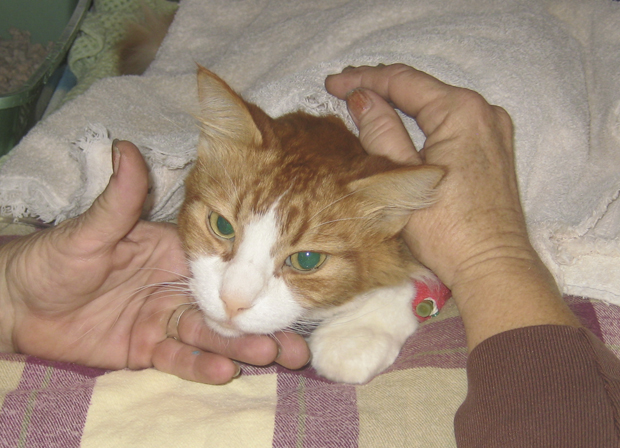Panleukopenia (Latin for a decrease in all of the white blood cells), also known as feline parvovirus, is a feline disease that is rare in our community thanks to vaccines. But it has been diagnosed in several cases recently.
We most commonly see this disease in kittens from 3 to 5 months of age, because up until that time, they are generally protected by their mother’s immune system by suckling. The panleukopenia virus is rarely encountered in vaccinated pet cats.

This is a blood panel that is typical of a cat with panleukopenia. The total number of white blood cells is low, along with two specific white blood cells called neutrophils and lymphocytes. Photos courtesy of Long Beach Animal Hospital (LBAH).
{loadposition adfloat}
Symptoms include a high fever, abdominal pain, lethargy, no appetite, vomiting and bloody diarrhea. These symptoms lead to rapid dehydration and death if not treated.

A major component of treatment for panleukopenia involves the hospital administration of intravenous fluids. This is crucial to correct the dehydration and give the kitten a chance to survive.
If a kitten gets the virus in the uterus before it is born, it might not survive. If it does, it could be born with a brain disorder called cerebellar hypoplasia. The cerebellum is responsible for balance and coordination.

If a kitten survives an in-utero infection it can get a disease called cerebellar hypoplasia. The cerebellum does not develop properly, and the kitten can be severely uncoordinated for the rest of its life.
Infected cats typically shed the virus from all body secretions but primarily in the feces, urine, blood, nasal secretions and other things that cats have come in contact with. Adult cats are usually immune but can shed the virus to other unvaccinated kittens.
There are no medications that kill the virus. Treatment consists of aggressive supportive care with intravenous fluids, antibiotics, antinausea drugs, vitamins and nutritional support. Severely affected kittens may require plasma or a blood transfusion. Unfortunately, the prognosis for recovery is guarded.

This cat is very ill and is closely monitored by our staff on important parameters like temperature and hydration status.
Vaccines offer safe and effective protection. FvRCP (feline viral rhinotracheitis, calicivirus, panleukopenia) vaccinations in kittens around 8 weeks old and repeat the vaccinations every month, for a total of three vaccinations.
Because of the serious nature of this disease and the ubiquity of the virus, vaccination is recommended for every cat. Even cats kept indoors can be infected, because the virus is so stable that it can be transmitted on fomites, for example, contaminated objects like bedding, cages, shoes, clothing, hands and food bowls.
Generally speaking, bleach or hydrogen peroxide have been shown to be effective in killing the panleukopenia virus in the environment.
To learn more about cat diseases, please visit our website.

